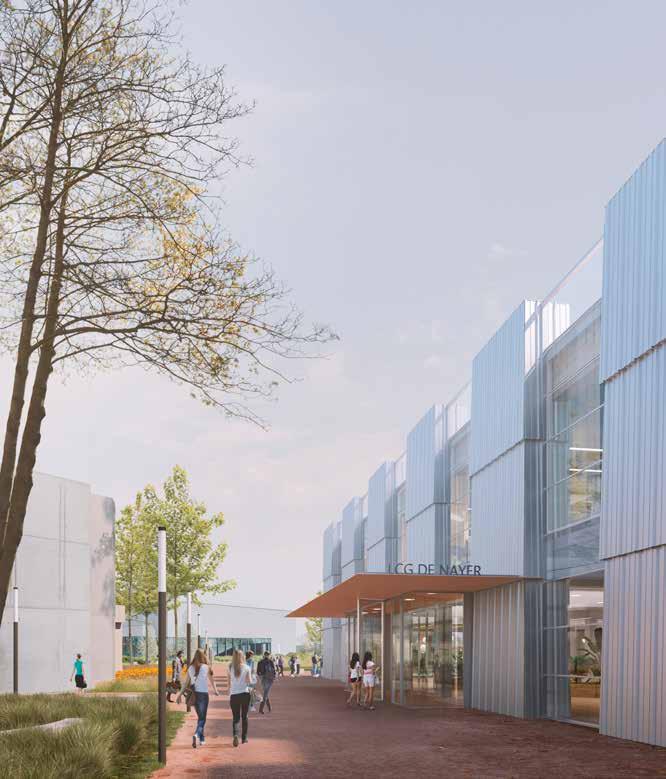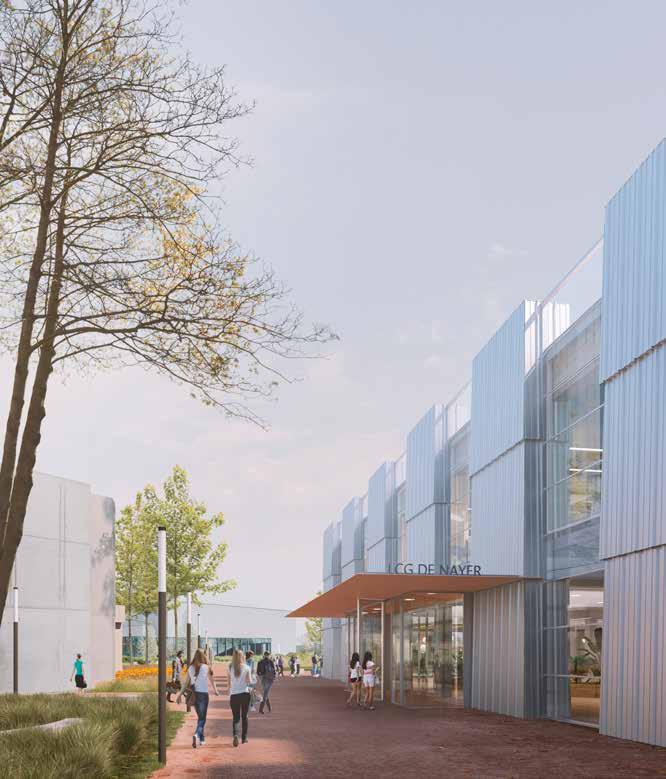
4 minute read
PROMISING PROSPECTS FOR THE DE NAYER CAMPUS
High visibility, strong technological appeal and high appeal to young talent. These are the goals that KU Leuven and Thomas More University College have in mind with respect to their new building plans on the De Nayer Campus. Adding a brand new research centre to a somewhat sleepy site in Sint-Katelijne-Waver will become a hotspot of creativity and innovation. If everything goes smoothly, sitework will start this academic year.
The current buildings date from 1982 and no longer meet KU Leuven’s current needs and ambitions”, says Professor Raf Dewil, former Campus Chair. “Therefore, the infrastructure is being thoroughly renovated and there is also substantial investment in new buildings. The entire site is thus undergoing a complete transformation and will become a beacon of renewal in the rural environment.”
Living Campus
The new campus is a multi-year project consisting of several phases. “The first phase, which will start this year, includes both new construction and renovation and aims to upgrade the campus into a place where it is pleasant to study, work, meet and relax”, says Wim Decoster, Programme Owner at KU Leuven’s New Construction & Laboratories Department. “The current concrete car park will disappear to make way for a green open space. In fact, the whole site will become car-free. There will be a separate entrance for vehicles to a newly constructed green park. Cyclists and pedestrians will also have their own access.”
“In the first phase, the main building will undergo major renovations”, Wim continues. “Two of the five existing blocks will disappear. In their place will rise a new Living Campus that includes a learning centre, a new restaurant and cafeteria, collaborative spaces, student facilities and campus services. Architecturally, the Living Campus will stand out as a tower rising above all the buildings. This tower will be a landmark, the face of the entire site.”
Metamorphosis
The Living Campus Tower will consist of five levels. “On the ground floor there will be a large lobby and you will also find the reception area, an administrative cluster and meeting rooms”, says Wim. “The first floor will also be dedicated to meeting with a foyer and variable spaces for group work. On the other floors, we set up classrooms that can be flexibly adapted. Even the roof will have an educational function. Students will be able to carry out measurements and experiments there as part of their studies or research.”
The remaining buildings of the main complex will be completely gutted, refurbished and equipped with all modern comforts. In this context, Wim speaks of an ‘inside-out effect’. “All technical facilities, cables and ventilation ducts will be made visible. The choice of materials, including natural colored materials, should also provide a technical look. The ‘Tradition in Engineering’ feeling that permeates the campus will be preserved in this way.” In a later phase, the construction of a new student residence with around 80 rooms is still planned.
Research campus
The second phase will have to wait until 2031. “The brand new research centre will be built on the site where the central car park is currently located”, Raf explains. “First to get a new building are the Chemical Engineering and Civil Engineering research groups. They not only count a large number of researchers but also need by far the most space. Since the Arenberg Campus in Leuven is gradually filling up, KU Leuven wants to accommodate the large research infrastructure on our campus. For example, civil engineering involves test equipment for robust steel and concrete constructions, whereas chemical engineering asks for test installations for water purification and resource recovery. So no scale models, but equipment of industrial caliber that lends itself to intensive collaboration with companies.”
With this investment, KU Leuven and Thomas More are betting heavily on growth. Growth in teaching, research and services. Growth also in students, researchers and staff. The Nayer Campus is becoming more than ever a strong brand”, Raf concludes. “A quality label that links tradition in engineering to future in high tech.”
Yves Persoons











